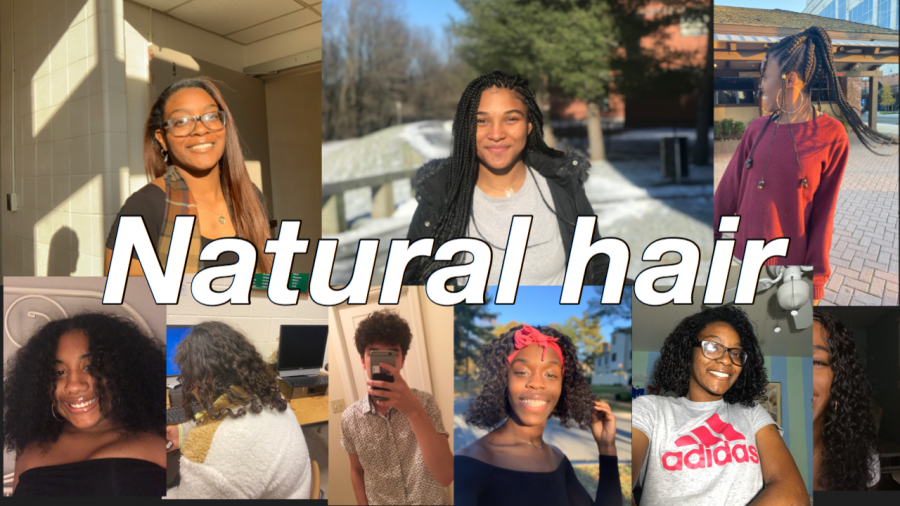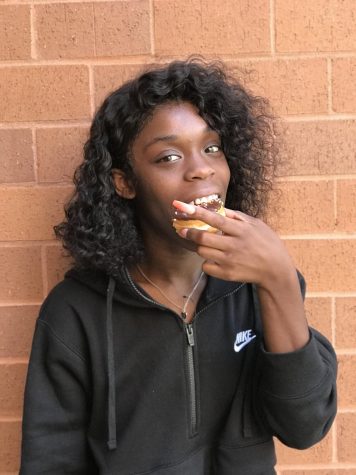Why Montgomery County’s protection of natural hairstyles matters
Seniors Leah Niles, Amelia Burton, Briana Bittings, Yesenia Pineda, and Arthur Siqueira, and junior Kayla Holt show off their natural hair in various styles.
December 2, 2019
My hair is my crown. I cherish my curls, and my strength lies within the naps that are so often referred to in a negative connotation. For years, black women’s hair was seen as unprofessional, un-kept, distracting, and ugly.
It’s hard to believe that a person’s hair could keep them from getting jobs, get them kicked out of school, or prevent them from housing. The discrimination of black people’s hair runs deep, all the way back to the 1700s, but history always continues on to the present if we don’t truly learn from it.
In 1786, New Orleans Governor Don Estevan Miro passed a law banning black women from showing their natural hair in public. Black women had to wear scarves, handkerchiefs, or what they called a Tignon.
The Tignon symbolized a lower class. It was a way to let the men know that the black women were either slaves or of slave descent. All of this just to devalue the black woman, but the reaction of the black women was the complete opposite. Black women embellished their Tignons with jewels and used fancy fabric. They fought to show there’s no stopping their beauty.
But years later, the texture of a person’s hair is still a prominent problem. Regardless of the shade of the person’s skin, curly hair wasn’t acceptable. And with the many laws banning discrimination in the workplace based on skin color, gender, sexuality, and religion, a ban on natural hairstyles is overdue.
Montgomery County is the first county in the nation to ban discrimination on natural hairstyles in the workplace, housing, taxi services, and public accommodations. Anyone caught discriminating can be charged a penalty up to $5,000. Some natural hairstyles include box braids, locks, an afro, and so many more.
This isn’t just a problem for black women; so many Hispanic women, white women, and Asian women with naturally curly hair have altered their hair at some point just to feel accepted.
Hair is not just hair when a group of people in society is being shamed into altering it. Why should one group be shamed while another group gets praised? A person’s hair can hold as much of their identity as a person’s name. There’s history in every curl — each bounce is unapologetically graceful and unique.
Hits : 3985




Peniel Rita • Dec 2, 2021 at 4:59 am
I really found you by accident, while I was browsing on bing for something else, Anyways I am here now and would just like to say thanks a lot for a marvelous post and an all-round interesting blog. I have bookmarked it and also added your RSS feeds. I really love the information you provided here.
Chris • Nov 22, 2021 at 7:28 am
Tienes una gran publicación aquí… Gracias por compartir
Ekene • Nov 8, 2021 at 3:46 pm
Thank you for your post
josh • May 6, 2020 at 12:22 pm
wow, so this is the reason why this hairstyle really matters I never know it was something as simple as this. very nice thank for sharing this post
Jeremiah Agware • Dec 27, 2019 at 11:05 am
This design is wicked! You most certainly know how to keep a reader amused.
Between your wit and your videos, I was almost moved to start
my own blog (well, almost…HaHa!) Excellent job. I really
loved what you had to say, and more than that, how you presented it.
Too cool! Any tips? Thank You!
Hope you Read Wapquick on my Site.
Looking for Free Downloads, check here.